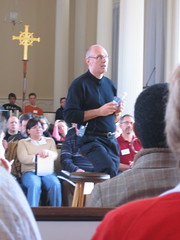 Image by knowtown via Flickr
Image by knowtown via Flickr
I want to take the theme of reconciliation forward, through a few posts based upon the book by Miroslav Volf (illustrated), Exclusion and Embrace. I first mentioned this book in January 2009, in the post Distinct and Related. At the time I said I was reading the book and would write a few more posts later. It's taken me a long time to finish it!
This is from page 198:
The question is whether Christians who want to uphold God's universal justice can judge between cultures with divine infallibility. The answer is that they cannot. For one, Christians stand inside a culture, inside a tradition, inside an interest group. Unlike God's knowledge, their knowledge is limited and distorted. Their judgements about what is just in concrete situations are inescapably particular. Hence Croatian Christians can disagree as much with Serbian Christians as they do with Muslims about whether a particular political stance or military action was just. Inversely, Croatian Christians may agree more with, say, Croatian atheists on what is just than with Serbian Christians. Second, well-meaning Christians disagree profoundly about the nature of justice. Western Christian fundamentalists disagree with Liberation Theologians about the very notion of justice, they claim that their account of justice is true because it is God's justice notwithstanding. And nonWestern conservative Christians may agree more with Liberation Theologians than with Western fundamentalists. We must therefore distinguish between our idea of God's justice and God's justice itself.
So, our knowledge of God's justice is limited and compromised. It is our failure to grasp the nature of our compromises with the world that I understand to be sin. All of us pick up cues, often unconsciously, from our own culture. What is just therefore seems obvious to us and so we respond to others, from different cultures, by projecting our evil onto them. Volf writes on page 53:
The images of communal survival and flourishing our culture feeds us all too easily blur our vision of God's new creation - America is a Christian nation, we then think for instance, and democracy the only true Christian political arrangement. Unaware that our culture has subverted our faith, we lose a place from which to judge our own culture.
Whilst I try to be aware of the prejudices I bring to conversations, it is entirely possible I am not conscious of the compromises I make. This is why humility is so important. Humility is understanding my justice is compromised; I cannot rely entirely upon my own judgement.
John Wesley in his sermon 'The Catholic Spirit', makes a similar point. Because of sin, I know what I believe to be true will in some respects be false. The problem is there is no way I can know for certain which beliefs are in fact false. This is a difficult truth to catch hold of if it is understood to be a form of moral relativism; it this is not to believe some or all views are equally valid. Perhaps it would be closer to the truth to argue no views are valid.
Perhaps the way to approach this is to examine the consequences of taking absolute positions and I will follow up with a contemporary example in my next post.


Comments